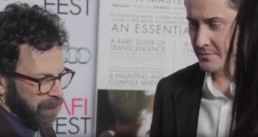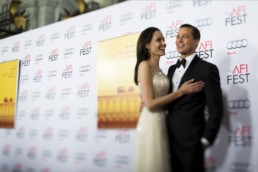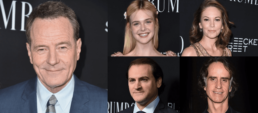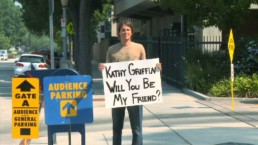Review: 'Peggy Guggenheim: Art Addict'
Art in Los Angeles has been an increasingly popular cultural activity lately; with the opening of the new contemporary art museum, The Broad, in Downtown LA, the millennial generation has seemed to put a bigger significance on experiencing art in person (whether or not this is just for social media purposes is a topic for another day). Today marks the release of a well-timed documentary that gives art lovers and creative types alike a colorful biography about one of the biggest influencers in art history, Peggy Guggenheim: Art Addict.
Everyone who knew Peggy loved her for her eccentricity and uniqueness. An heiress to the Guggenheim family fortune, Peggy often called herself the "black sheep" of her upper-class family. She loved being the center of attention and even shaved off her eyebrows as a teenager in rebellion to her preception of society's pressure on young women at the time. Peggy reveals her tragic upbringing, which included the death of her father when he drowned aboard the Titanic, to her biographer in audio tapes that were long thought of as lost but thankfully have been found for audiences to enjoy.
From giving Jackson Pollock his first break to being credited as one of the first galleries to mix European and American art, Peggy's candidness and vulnerability when talking to Weld are both inspiring and heartbreaking.
Director Lisa Immordino Vreeland uncovered the recordings between Peggy and biographer/ author Jacqueline B. Weld in Weld's basement and upon hearing the tapes, knew Peggy's story had to be told. This interview would also be the last Peggy ever gave before her death and Vreeland treats the significance of these tapes with the utmost respect and care. The "who's who" of the avant-garde world, including Marina Abramovic and Larry Gagosian, the art dealer who owns the Gagosian Gallery chain of art galleries reminisce about Pegg and the life-changing contributions she made to the art world. From giving Jackson Pollock his first break to being credited as one of the first galleries to mix European and American art, Peggy's candidness and vulnerability while talking to Weld are both inspiring and heartbreaking.
Peggy Guggenheim: Art Addict is just as diverse and spectacular as Ms. Guggenheim herself was. The film will leave viewers with a sense of wanderlust and admiration for a woman who helped define the art world as we know it. Guggenheim had its world premiere at the Tribeca Film Festival earlier this year and opens theatrically today.
Peggy Guggenheim: Art Addict is now playing at the Nuart Theatre.
https://www.youtube.com/watch?v=V8yy8Opyjcs
Charlie Kaufman, Jennifer Jason Leigh on 'Anomalisa'
With high winds (blaming that on the semi-decent audio quality) and only a few minutes to spare before the Anomalisa screening at the 2015 AFI FEST, Cinemacy had the opportunity to talk to Charlie Kaufman and Jennifer Jason Leigh. Our interview is short and sweet!
Anomalisa opens in select theaters on December 30, everywhere January 2016.
AFI Fest Review: 'Funny Bunny'
In the "American Independent" film category this year is director Alison Bagnall's oddball dark comedy Funny Bunny, an introspective look at a peculiar love triangle with three very quirky characters. Each one struggling with inner demons, they realize that their problems are what unites them, forming the most unlikeliest of friendships. Despite the lighthearted title, nothing is particularly funny about Funny Bunny, but it does leave one reflecting on human connections and the search for happiness.
Gene (Kentucker Audley) is a childhood obesity advocate who distracts himself from his failing marriage by going door-to-door in the hopes that someone will give him the five minutes he needs to get through his well-rehearsed pitch. When he knocks on the door of a large mansion, he is surprised to be greeted by a boy who calls himself Titty (Olly Alexander). Titty lives alone in the giant house and keeps himself entertained by pretending to be an owl and obsessing over a girl he knows only from her webcam antics, which include trying on wigs, sticking out her tongue in her array of funny faces, and playing with her bunny.
Reminiscent of last year's Felt, Funny Bunny is a good festival pick, and perfect for those with a taste for eccentric films.
The girl captures Titty's attention to the degree that he even goes so far as to donate money for her bunny's "medical bills". Gene relates to the desperation in Titty's face as he, himself, is dealing with heartache, and decides to help Titty meet the girl in person. When Titty and Gene finally meet Ginger (Joslyn Jensen) she doesn't seem to be as "together" as he imagined from her online persona. Ginger is obviously just as lost as the two of them. A self-proclaimed staunch, animal rights activist, Ginger convinces Gene and Titty to help her and her friends release pigs from a local farm. This shared experience allows the trio to foster a relationship strong enough to let their guard down and learn to trust again.
Funny Bunny does have some cool elements to the film but, unfortunately, there isn't one characteristic that is strong enough to leave a lasting impression past its festival run. As expected, the performances from Olly Alexander and Kentucker Audley are strong and likeable. Joslyn Jensen does a fine job, but it isn't until the near end of the film when she is really given a platform to display her acting abilities. It is Ginger's total breakdown proves to be one of the best scenes of the film. Slightly reminiscent of last year's Felt, Funny Bunny is a good festival pick, and perfect for those with a taste for eccentric films.
Funny Bunny will be released in select NY theaters on November 13th.
https://www.youtube.com/watch?v=5TNAR094FKw
AFI FEST 2015
As each fall season brings the year’s Academy Award-vying Oscar hopeful films, so to brings AFI FEST 2015 presented by Audi, which CINEMACY attended this former weekend. Held in the heart of Hollywood at (formerly Grauman’s) TCL Chinese Theatre, the film festival features an impressive range of diverse films and special events, where new American Independent films play alongside documentaries from the Netherlands and feature-length narratives from China, and beyond. The festival’s opening night film this past Thursday was the highly anticipated drama By The Sea, directed by Angelina Jolie who also co-stars alongside her husband, Brad Pitt. The closing film premiers on Thursday and is another hyped title, The Big Short, starring Christian Bale, Steve Carell, and Ryan Gosling.
Once again, the CINEMACY team set out to cover a wide variety of different films this year, look for our reviews throughout the week, and even a few of these titles to come out in theaters soon!
Review: 'Heart of a Dog'
A melancholic, yet beautiful, tribute to the human experience, artist/ director Laurie Anderson's Heart of a Dog combines animation, stock footage, and personal home movies to create a phenomenal experimental film, proving especially powerful for those of us who love dogs. The passing of her rat terrier Lolabelle, whom she not so subtly describes as her child, serves as the catalyst for the film. At just over an hour runtime, Heart of a Dog is a meditative journey through one woman's experience of love and loss that creates an unforgettable cinematic watch.
Technically, Heart of a Dog is categorized as a documentary, but it is more of a personal essay film as there is no true linear story to speak of. It plays out as a series of thoughts randomly connecting in Anderson's brain; the anecdotes about her childhood, the effects of 9/11, and the similarities between a dog's fears and our own are all explored and met with stark conclusions.
Fans of performance artist Marina Abramović may find similarities in Anderson's work and visual presentation, but is really a film for everyone so long as you are open to the experience and remain open-minded.
Some of the most interesting moments are when we see Anderson's daily life through her dog's point of view. The audience gets up close and personal with a slobbering bulldog, we cross the busy New York City streets and travel through the tall fields near the California coastline all from the perspective of her K9 companion. This, of course, is when Lolabelle still had her sight. Once her vision started to go, Anderson creatively found ways to keep Lolabelle's spirits up by teaching her how to play the piano and sculpt with clay. Granted, these things are near impossible to "teach" a dog, but the footage of Lolabelle enjoying these activities in her old age is one of the sweetest things I have ever seen.
Anderson, a Buddhist, has a way of speaking that puts the audience at ease. Her talk of death is not morbid, but rather wondrous, as she states she is not afraid of dying, "I came from the sky and knew that one day I would go back," and, "The process of death is the release of love." In the Tibetan afterlife the deceased, including Lolabelle, go through a 45 day decompressing period where their spirit and energy is transferred to their next life. It is comforting for Anderson to know Lolabelle will soon enjoy life on earth again, and instead of feeling lonely or sad for herself, she passes the time by painting murals of Lolabelle, which can be seen in the above picture.
Fans of performance artist Marina Abramović may find similarities in Anderson's work and visual presentation, but this is really a film for everyone so long as you are able to surrender to the experience and remain open-minded. Those going through a difficult time will especially find solace in Heart of a Dog as Anderson's spiritual knowledge is applicable to so many life situations. All around a daring and moving experience that deserves to be seen.
Heart of a Dog opens in Los Angeles at the Nuart today, national expansion to follow.
https://www.youtube.com/watch?v=HnKVjZfKhYs
Bryan Cranston, Elle Fanning, Diane Lane, Michael Stahlbarg & Jay Roach on 'Trumbo'
[soundcloud url="https://api.soundcloud.com/tracks/231636538" params="color=ff5500&auto_play=false&hide_related=false&show_comments=true&show_user=true&show_reposts=false" width="100%" height="166" iframe="true" /]
Bryan Cranston, Diane Lane, Elle Fanning, Michael Stuhlbarg, and director Jay Roach take their seats at the rectangular table to begin our press conference at The Four Seasons Hotel. Immediately, I'm drawn to each and every one of them- all laughing and in genuine good spirits. For those who are familiar with her work, what I'm about to say is obvious: Elle Fanning is one of the sweetest and most down-to-earth young actresses I've ever spoken to. Her effervescent personality shines from the very beginning of the interview, as she is genuinely surprised to be asked the first question. Not to be upstaged was the man himself, Mr. Bryan Cranston, who joked around with Elle, exclaiming "What the Elle?" when she was asked the first question, and he was not. This little snippet into the relationship of the cast only further proves that they have truly something special, it's not just "movie magic". Cranston talks about getting into the character of Dalton, incessant smoking included, while Fanning talks about her favorite costumes as Dalton’s daughter, Nikola Trumbo. From Roach’s interest in the Hollywood Ten to Stuhlbarg and Lane’s initial script impressions, our interview highlights the individual connections each of them made to the film, and it is nothing short of inspiring. We begin:
Elle, were you aware of the "Hollywood Ten"?
Elle Fanning: Before reading this script, I wasn't aware that the Blacklist or the "Hollywood Ten" existed, so it was shocking to learn that part of history. After I read it I asked my parents about it and they were like yeah, that actually happened. Getting to play Nikki Trumbo was really special and I hope I did her justice in that way.
Dalton Trumbo has very distinct characteristics, can you talk about getting into character, specifically the voice?
Bryan Cranston: There is a double entendre to that: the "voice" of Trumbo. There is a lot of source material, video, and audio tapes, on him, but you can get lost in that. If you only focus on the source material, you could start down a road of impersonation and I wanted to be very careful not to do that. That being said, he was a very flamboyant character, he was a beautiful, wonderful, big character. It's kind of an amalgam of research, like a detective assembling clues. Every time I start a show or a character, I always envision him somewhere outside of me, and I feel like the more research I do or the more I talk to people, the closer he gets. At some point, you have to have trust and faith that he becomes a part of you.

What were the challenges of Trumbo's working conditions? Writing in the bath and chain-smoking, etc...
Bryan Cranston: The challenge of working in the bathtub was not to get pruney fingers, and not to drink too much before getting into the bathtub. After staying in there for an hour or two or three, sheepishly asking for another bucket of hot water. Then discreetly placing that desk so that no one sees something they shouldn't, and believe me, no one should see this.
Laughter
Bryan Cranston: For the cigarettes, I stupidly thought, "well, I'll definitely not smoke real cigarettes because then I'll protect myself from ingesting nicotine and tar". But then I realized I'm still inhaling smoke, smoke is going into my lungs, and there were many times when we were looking for places in the script where I didn't have to smoke. But Mitzi and Nikki [Trumbo] said their dad was a chimney, he often lit one cigarette to the other. So that was more of a physical challenge.
Elle, can you talk about the fashion during this time period? What did you like best?
Elle Fanning: I went through so many different time periods of clothes, from the 50s through 70s, so that was exciting. I remember the day I had to be the oldest version of myself, I was in this vintage Halston dress, I did my hair and had on a lot of makeup, and the first AD came over to me and said, "Hello, nice to meet you. You're going to sit here," thinking I was just part of the background actors, and I was like, "No it's Elle! I've been working with you for a long time now!" He didn't recognize me!
Diane, what was it like to explore the Hollywood history that you grew up in?
Diane Lane: I'll steal a quote from Dame Helen Mirren when she said on last night's red carpet that Heda Hopper chased Charlie Chaplin right out of the United States, singlehandedly as a personal mission of hers. Dalton Trumbo really did a tremendous service to this country when he undermined them at their own game. This movie needed to get made and it's just a perfect story that happens to be true! John MacNamara did such a tremendous job with the screenplay because he encapsulated so much of one man's heroic journey.

Is there a cautionary tale in Trumbo?
Bryan Cranston: I think embedded in the story is a definitely a cautionary tale, but the film, first and foremost, is entertainment. And I think through entertainment we'll have more people possibly taking with them the message that is behind it. I think anytime a government sets out to oppress civil liberties that the citizens need to be very concerned and speak up. Stand up. Hopefully, the younger generation will be able to learn from that and see its parallels when they pop up. As Jay [Roach, director] pointed out very astutely last night, some people may equate what happened in the movie to Benghazi hearings- spending millions and millions of dollars, months and months of energy, and that's over-reach.
What attracted you to this story as a director?
Jay Roach: I've always been interested in how dangerous ideas spread, you can see it in the other films I've done like Game Change and Recount. It's the idea of people sitting around a room and saying, 'I know, let's take a fear, like a genuine threat, and apply it to some of our political enemies and destroy their careers.' That logic is so fascinating, and someone like Heda Hopper who had 32 million readers could sell that notion and get people, friends, colleagues, to turn on each other and literally try to destroy each other's lives. These movies to me are therapy because I get so anxious, could this happen again? Yes, this could happen again! But I also fell in love with this man and his writing and his heart and his soul, the letters he wrote from jail to his wife and kids, some of the funny letters he wrote to his enemies... he called one producer who wanted to be his friend thought he should stop talking, he called him a "political hermaphrodite." I connected to him, and then when we got this cast it was like, ok, this is a director's paradise.

What was your initial impression of your character when you first read the script?
Michael Stahlbarg: I read the script and started digging up and writing things down about Mr. Robinson, I was quietly excited and quietly terrified at the same time at the prospect of getting into the shoes of somebody of such stature and talent and as iconic as Edward G. Robinson was. I really enjoyed the private exploration the script dealt with in terms of his journey. It was so much fun to be a part of so much laughter.
Elle Fanning: When I learned Diane Lane and Bryan Cranston were going to be my parents, I was freaking out.
Laughter
Diane Lane: I've been a huge Jay Roach fan and was hoping that if I didn't get the part, he'd still see that I could be funny on purpose and hire me for a comedy in the future. I came to the office to meet for the job and I had already taken a juggling lesson to impress upon the seriousness of my commitment. I thought 'God help me if I got the part,' because I needed every possible moment to prepare for that scene.
Bryan Cranston: The script is always the first thing that attracts an actor, and this was A+. Then I looked at the character, the director and the rest of the cast. It's an important factor- does the director have the sensibility and the sensitivity to be able to explore and navigate a bunch of actors with different ways of approaching the work- there's no one size fits all- and it takes a very insightful person to be able to do that. Despite his lack of those qualities...
Laughter
After talking to Jay it was an easy yes for me.
For our review of Trumbo, click here.
Review: 'Why I'm Not on Facebook'
Facebook. Is. Everywhere. This obvious, but still terrifying, fact, is how TV personality and director Brant Pinvidic chooses to introduce audiences to his latest documentary, Why I'm Not on Facebook. As a millennial who actually doesn't have a Facebook myself, Pinvidic's reasonings for shunning the social network definitely peaked my curiosity. And in just over an hour, he seems to hit on every pro and con that comes with an online profile. Despite an interesting premise and a seemingly built-in audience, it's a shame that the low production value and over-abundance of gimmicks distract from the film's bigger message about the societal impact of the Facebook revolution.
It only took about six years for the phenomenon that is Facebook to go from small college campuses to the White House. Currently, there are more than a billion people registered and its founder Marc Zuckerberg has become as recognizable a name as The Beatles or Ronald McDonald. As Facebook has increasingly become an overwhelming part of how we communicate with others, it wasn't until his preteen son expressed a desire to join the network that Pinvidic really became aware of its grasp and set out on a mission, with cameras in tow, to answer the question, "Is something wrong with Facebook, or is something wrong with me?"
So Pinvidic set out on a mission and with cameras in tow, tried to answer the question, "Is something wrong with Facebook, or is something wrong with me?"
Interviews from the infamous Winklevoss twins Cameron and Tyler prove entertaining as they share that despite the very public legal battle against the corporation, they do in fact have Facebook profiles. Pop cultural celebrities like Dr. Drew Pinsky and Rosanne Barr are familiar faces as they talk about how Facebook affects them and the narcissism of it all.
Why I'm Not on Facebook should serve as inspiration for all documentary filmmakers who have the motivation to create but feel held back financially. Granted, it looks as if this film was made in the early 2000s' with flip cameras as a major source of capturing footage, yet, through a little detective work, I figured out it was actually made in 2012- shocking! Overall the film feels too hokey to be taken seriously, and while it is intentionally cheesy- perhaps to intrigue younger audience members- there are more than a few moments when I questioned Pinvidic's direction. An animated Mark Zuckerburg turning into a human-eating alien during the film's title sequence should give you a good idea of the movie's tone.
There are other, perhaps better, movies about the Facebook phenomenon that don't feel as dated as this one. Cyber-Seniors, for example, is a timeless documentary that deals with senior citizens navigating the internet and using Facebook for the first time. Then there is, of course, David Fincher's The Social Network which brought Jesse Eisenberg's portrayal as Mark Zuckerberg a nomination for Best Lead Actor. Why I'm Not on Facebook is a very thorough examination about the social media's effect on our generation, but visually the film looks dated and feels about 5 years too late in its release to fully make an impact.
Why I'm Not on Facebook opens on VOD today.
https://www.youtube.com/watch?v=lq2-wE9qLxE
First Look at a Social Media Addict in 'Why I'm Not on Facebook'
We scored an exclusive clip of Why I'm Not on Facebook, the documentary from TV personality and director Brant Pinvidic. Blending real life interviews with news clips, TV shows, and other archival footage, he documents his search for the meaning of Facebook with a casual storytelling style that is both personal and endearing. The deeper he explores the social network’s vice-like grip on those who use it the more he realizes the answers to its popularity lie within. Whether you’re a fan of Facebook or not, this is one film that is funny, fascinating and a must for anyone wondering what everyone is talking about.
Why I'm Not on Facebook is available On Demand everywhere today.








